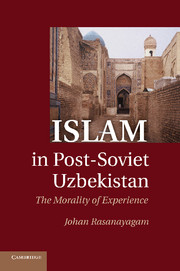Book contents
- Frontmatter
- Contents
- Illustrations
- Acknowledgements
- Note on Transliteration
- MAP: Uzbekistan and its neighbours
- Introduction: Towards an Anthropology of Moral Reasoning
- 1 Islam and Sociality in Pakhtabad and Samarkand
- 2 The New Soviet (Central Asian) Person and the Colonisation of Consciousness
- 3 Good and Bad Islam after the Soviet Union
- 4 The Practical Hegemony of State Discourse
- 5 The Moral Sources of Experience
- 6 Moral Reasoning through the Experience of Illness
- 7 Debating Islam through the Spirits
- 8 Experience, Intelligibility, and Tradition
- Notes
- Bibliography
- Index
5 - The Moral Sources of Experience
Social, Supernatural, and Material Worlds
Published online by Cambridge University Press: 01 March 2011
- Frontmatter
- Contents
- Illustrations
- Acknowledgements
- Note on Transliteration
- MAP: Uzbekistan and its neighbours
- Introduction: Towards an Anthropology of Moral Reasoning
- 1 Islam and Sociality in Pakhtabad and Samarkand
- 2 The New Soviet (Central Asian) Person and the Colonisation of Consciousness
- 3 Good and Bad Islam after the Soviet Union
- 4 The Practical Hegemony of State Discourse
- 5 The Moral Sources of Experience
- 6 Moral Reasoning through the Experience of Illness
- 7 Debating Islam through the Spirits
- 8 Experience, Intelligibility, and Tradition
- Notes
- Bibliography
- Index
Summary
Previous chapters have focused on power and hegemony. They have described the discursive regimes of the Soviet and postindependence states: their efforts to classify social space and the category of religion, and to fashion citizen-subjects. In the remainder of the book, I turn to experience as a site for moral reasoning, and this chapter develops the theme of moral sources, the transcendent locations that give experience its moral quality.
An Aqiqa to'y
In the spring of 2004, I accompanied Tohirjon, my host in Pakhtabad, to an aqiqa to'y in a neighbouring mahalla. An aqiqa to'y is an event common to many Muslim societies held in connection with the birth of a child. The head of the household was a butcher whose son and kelin (daughter-in-law) had been having difficulty conceiving a child. Finally, the older sister of the kelin agreed to give the couple a baby girl. The aqiqa to'y followed the template of other celebratory feasting occasions, such as a circumcision or wedding feast. On this occasion, however, the hosts chose to give the event a particularly distinct Islamic character, a practice that has been on the increase since independence. The head of the household, the butcher, who was known by the honorific title of Hoji-bobo, had made the hajj pilgrimage to Mecca, which may have influenced his choice.
- Type
- Chapter
- Information
- Islam in Post-Soviet UzbekistanThe Morality of Experience, pp. 154 - 179Publisher: Cambridge University PressPrint publication year: 2010

